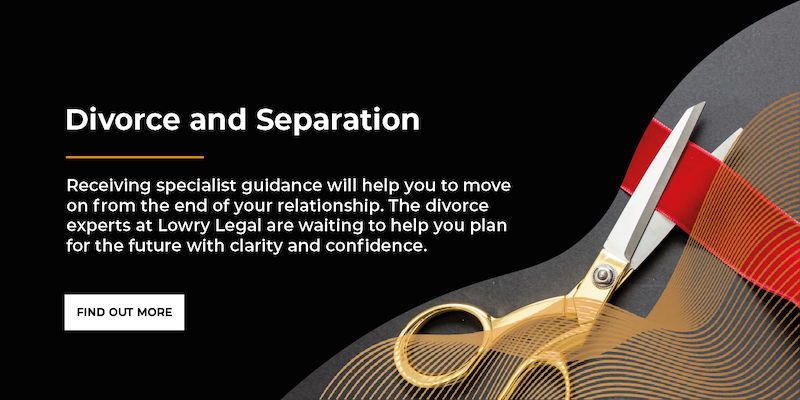
Talking about finances after separation can be one of the most challenging factors in any divorce or separation. In high net worth relationships, the volume of valuable assets can make anger and hostility feel unavoidable. However, in the words of American author Max Lucado, “Conflict is inevitable but combat is optional.” If you’re looking to address shared finances collaboratively, there are always alternatives to combat, if you know where to look.
By harnessing the benefits of divorce mediation, financial disclosure doesn’t necessarily have to feel like an immovable obstacle. Let’s take a look at the benefits of voluntary financial disclosure, divorce mediation strategies, and more, in our quest to outline how divorce really can be made less confrontational.
Why is Voluntary Financial Disclosure So Important?
Voluntary financial disclosure can be one of the most contentious aspects during divorce proceedings. At this juncture, both parties are expected to submit full information about personal and joint finances, savings, properties, etc. Voluntary financial disclosure is important as, otherwise, it would be almost impossible for spouses to have a detailed understanding of the size of their matrimonial pot.
Financial disclosure is a legal necessity, with potentially severe penalties in place for anyone found to have hidden assets. Once finances have been properly discussed, a financial settlement can be formalised via Form E into a consent order. This will reflect how finances are to be divided and is eventually made legally-binding by the courts. However, much will depend upon how easily both sides can satisfy the need for full and frank disclosure.
It’s important to note that reaching a financial settlement can quickly and easily become complex and emotionally challenging during even relatively ‘modest’ separations. When it comes to high net worth divorces, the presence of significant assets like businesses, investments, and valuable properties can make voluntary financial disclosure even more difficult. In some cases, the obstacles between spouses might prove serious enough to require alternative forms of dispute resolution, such as in a high conflict divorce, mediation.
The Benefits of Divorce Mediation & Financial Disclosure
Generally speaking, the easier a couple can address their finances, the less time-consuming and expensive their divorce will prove to be. In an ideal world, both parties will be able to come together and talk openly about assets without lingering feelings of doubt or suspicion. However, bad blood stemming from the end of a relationship can quickly derail the process.
This is where divorce mediation and financial disclosure can combine to break the impasse. The potential benefits to this form of alternative dispute resolution are significant. They include:
- Save Time and Money: It’s often much more efficient and cost-effective than having to go to court.
- Positive Foundation for the Future: Mediation can not only help couples to talk about voluntary financial disclosure, it might also make them better equipped to resolve future issues.
- A Discreet Environment: Anything discussed with mediators is confidential, which is appealing for any high profile or public figures.
- An Impartial Dynamic: Mediators don’t take sides. In fact, their neutrality often makes it easier for both sides to feel heard and open up.
- More Flexible Options: Divorce mediation and financial disclosure can touch upon complex issues and intricate finances. Mediation can approach these situations with innovative solutions and bespoke strategies designed to find a quicker resolution.
- Mediation Can Empower Couples: As active participants, a divorcing couple could find the feeling of being in control helps them to feel more engaged.
If you’re in the early stages of divorce, it’s essential to obtain legal advice from a family law specialist. If they think that you would benefit from mediation, they should discuss that with you at an early stage and refer you if appropriate.
Could High Conflict Divorce Mediation Work For You?
High conflict divorce mediation describes relationships where one or both parties struggle to talk collaboratively about areas such as voluntary financial disclosure, or wonder if it’s even necessary. The dynamic might be characterised by excessive negativity, inability to compromise, rejection of reasonable solutions, raising of last-ditch issues, or a failure to empathise or self-reflect. This imbalance can often be attributed to former spouses being at different stages in their acceptance of the situation they find themselves in.
High conflict divorce mediation can be an effective tool in this type of relationship. Sessions are structured to ensure the conversation remains on target, so the mediator can help both sides work around any potential flashpoints as efficiently as possible. If you are of the opinion that voluntary financial disclosure could be difficult to achieve, high conflict divorce mediation could be one of the most useful strategies available to you.
Mediators always assess whether or not a couple are suitable for mediation. If they feel that the conflict is such that mediation is not suitable they would refer the couple back to their respective solicitors.
Divorce Mediation Strategies and Tips
Divorce is widely viewed as one of the most stressful life events a person can go through. However, there are a range of divorce mediation strategies that could offer both practical and emotional benefits. These range from being willing to find compromises and hear opposing views to taking a more forward-thinking view of the wider divorce process.
If you’re anticipating a complex separation, the following divorce mediation strategies and tips could set the scene for a more amicable process:
- Give Yourself Time: To get the most out of the process, it’s important to feel emotionally prepared before you begin.
- Look Ahead:. Divorce mediation & financial disclosure work better when you’re focused on what you want to achieve, and not whatever has happened in the past.
- Prioritise: There’s usually a lot to discuss. Think about what you want to resolve and fix priority order.
- Be a Good Listener: One of the most important divorce mediation strategies, this will help you to understand the other party’s perspective. Once established, it’s much easier to reach a suitable agreement.
- Find Compromises: No matter how elusive it might seem, there is always potential for compromise. Don’t see this as a sign of defeat, instead view it as being the route to a quicker resolution.
The last of our divorce mediation strategies is often most useful. Remember that you might not be able to influence the other party’s behaviour, but you can control your own. If you go into mediation with an open mind and a determination to find solutions, it’s much more likely to create a more amicable and productive atmosphere.
Lowry Legal: Leaders in Divorce Mediation & Financial Disclosure
At Lowry Legal we understand that every divorce is different. However, our commitment to finding a collaborative resolution for the most complex points remains constant. We specialise in offering legal guidance for relationships containing significant wealth. This experience means we’re well-equipped to navigate even the most challenging circumstances, including relationships that have an international dimension.
When it comes to divorce mediation and financial disclosure, we’ll do what it takes to avoid the expense and worry of the courts. One of our partners is recognised by the Legal 500 as a leading mediator. They describe Michelle as, “Calm, empathetic, and knowledgeable…she is kind to clients and cares for them, but always gives it to them straight. She is wise and far-seeing – clients like her and will travel with her.”
Empathic but proactive, we give reliable legal guidance that encourages voluntary financial disclosure where possible. We tailor our approach to your case, which often leads to innovative divorce mediation strategies. If this isn’t practical, we’ll do what it takes to reach a resolution that works for you.
For more information about how our team can help, get in touch with us today.



![What am I Entitled to in a Divorce Settlement [Getting a Fair Share]?](https://lowrylegal.co.uk/wp-content/uploads/2024/07/positive-woman-resting-on-couch-and-reading-magazi-2023-11-27-05-01-55-utc-500x383.jpg)






